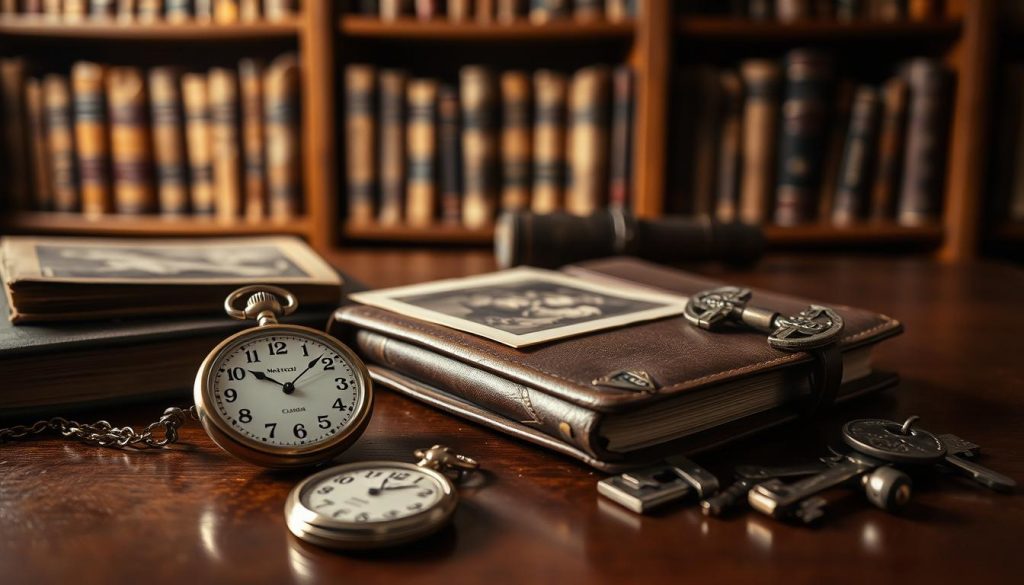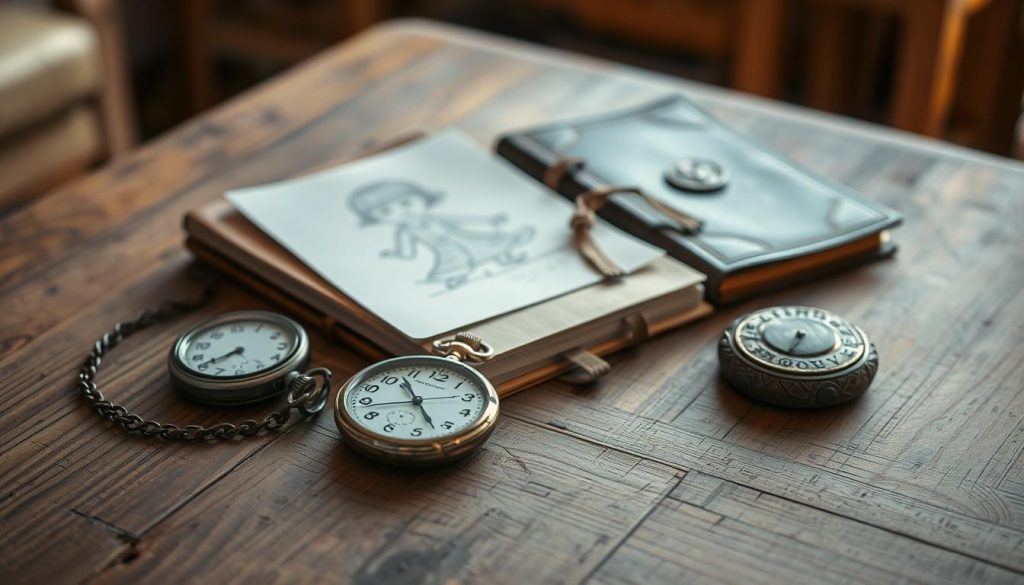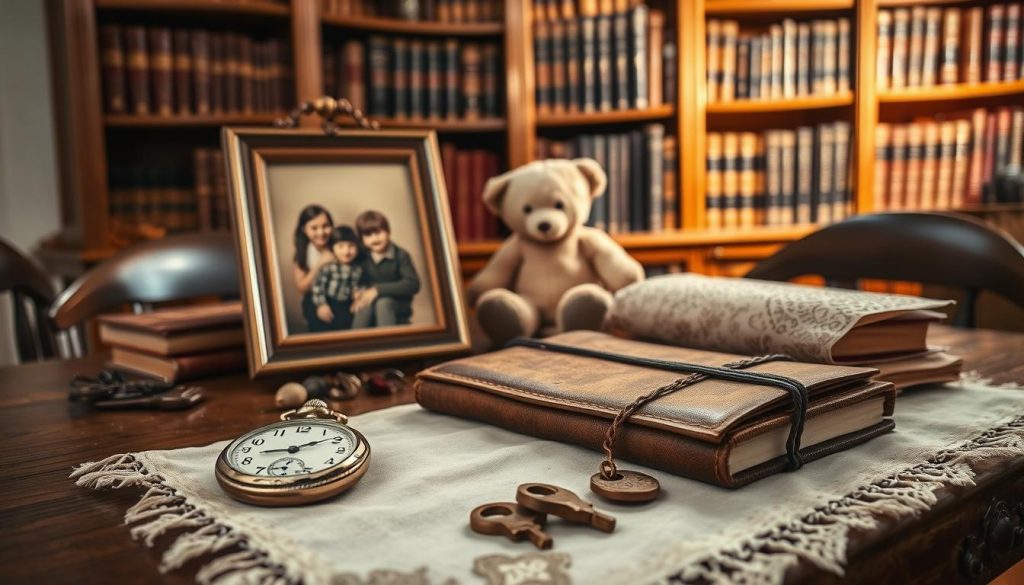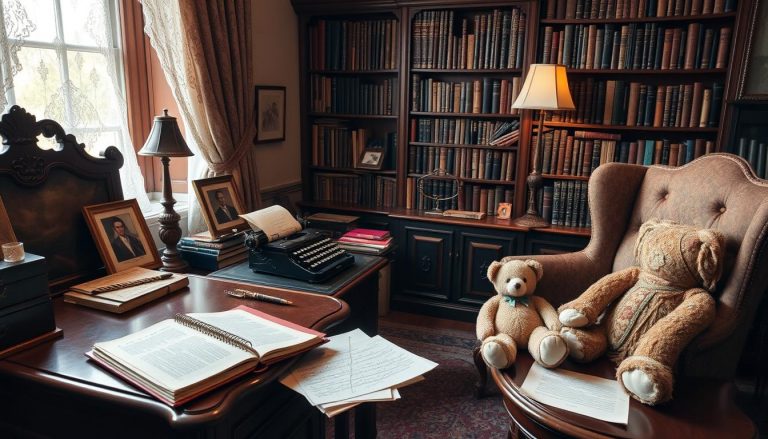As we accumulate possessions throughout our lives, certain belongings become imbued with emotional significance. When creating a Will, it’s essential to consider who should inherit these treasured possessions. Although personal belongings may constitute a relatively small portion of one’s overall estate value, failing to address them properly in the Will can lead to disagreements among family members.
We understand that handling personal belongings and sentimental items in your estate plan can be challenging. These possessions often hold significant emotional value, and their distribution can be a source of conflict among loved ones if not properly addressed. Our guidance will help you navigate this process, ensuring that your wishes are respected and your family is protected.
Key Takeaways
- Identify the sentimental belongings that hold emotional significance
- Consider the potential for conflict among family members when distributing personal belongings
- Understand the importance of addressing sentimental items in your estate plan
- Learn how to effectively incorporate your wishes into your Will
- Ensure that your loved ones are protected and your wishes are respected
Understanding the Importance of Sentimental Items
Family heirlooms and other sentimental items are more than just possessions; they are tangible connections to our past. These items hold emotional significance and are often treasured by family members, making them a crucial aspect of estate planning.

What are Sentimental Items?
Sentimental items can include a wide range of personal belongings such as family heirlooms, photographs, jewellery, and other items that hold emotional value. These possessions are not just valuable for their monetary worth but for the memories and history they represent.
As noted by experts, “Heirlooms are not just items; they represent history, memories, and connections to loved ones.” Incorporating these items into your estate plan ensures that they are distributed according to your wishes, thus protecting your family’s heritage.
Why They Matter in Your Estate Plan
Understanding the importance of sentimental items is crucial in estate planning, as they can be a source of conflict among heirs if not properly addressed. By identifying and documenting these items, you can ensure that they are distributed according to your wishes and that your loved ones are protected.
For more information on protecting your heirlooms and sentimental assets, consider seeking professional guidance to ensure that your estate plan is comprehensive and legally binding.
By incorporating sentimental items into your estate plan, you can:
- Ensure the distribution of cherished family heirlooms according to your wishes.
- Minimise potential disputes among your heirs.
- Preserve your family’s history and heritage.
Distinguishing Between Personal and Sentimental Belongings
As you plan your estate, distinguishing between personal items and those that hold sentimental value becomes increasingly important. This distinction helps in making informed decisions about the distribution of your belongings according to your wishes.
Personal belongings are items that are used or enjoyed by individuals on a daily basis, such as furniture, clothing, or jewellery. On the other hand, sentimental belongings are items that hold emotional significance, often due to their association with memories or loved ones. These can include heirlooms, photographs, or personal letters.

Classifying Your Items
Classifying your belongings into personal and sentimental categories can simplify the process of estate planning. To do this effectively, we recommend making a list of your possessions and identifying which category each item falls into. This exercise not only helps in understanding the value of your belongings but also in deciding how they should be distributed.
For instance, a family heirloom passed down through generations may hold significant sentimental value, while a piece of jewellery might have both monetary and emotional worth. By categorizing these items, you can make more informed decisions about their distribution.
The Emotional Value vs. Monetary Value
Understanding the difference between the emotional and monetary value of your belongings is crucial. While some items may have a high monetary value, others may be priceless due to their sentimental significance. For example, a vintage watch might have a considerable monetary value, but a locket with a loved one’s photograph is invaluable due to its emotional significance.
When planning your estate, it’s essential to consider both aspects. This consideration ensures that your belongings are distributed in a way that respects both their monetary worth and their emotional significance to your family.
How to Document Your Sentimental Items
To ensure your cherished belongings are passed down to future generations, careful documentation is necessary. Documenting your sentimental items is a crucial step in estate planning, helping to prevent conflicts and ensure that your wishes are respected.
Creating an Inventory
The first step in documenting your sentimental items is to create a comprehensive inventory. This involves listing each item along with its significance and any relevant details. For instance, if you have a family heirloom such as a grandfather clock, you might note its history, the materials it’s made of, and any notable events associated with it.
To make this process easier, consider the following steps:
- Take photographs of each item.
- Write a detailed description, including any historical context.
- Note the item’s location within your estate.
Assigning Specific Items to Heirs
Once you have created an inventory, the next step is to decide who will inherit each sentimental item. This can be a challenging task, as it involves considering the emotional and sometimes monetary value of each item. It’s essential to be clear and specific about your wishes to avoid any potential disputes among your heirs.
One effective way to assign items is to include a personal property memorandum in your will or trust. This document allows you to provide detailed instructions on the distribution of your sentimental belongings, ensuring that your wishes are carried out.

By taking these steps, you can ensure that your sentimental items are protected and passed down to future generations according to your wishes. This not only preserves family history but also minimises the risk of conflicts among your heirs.
Legal Considerations for Estate Planning
The legal aspects of estate planning are vital to ensure that your personal belongings and sentimental items are handled according to your wishes. In the UK, the legal framework provides several tools to help you achieve this.
Understanding Wills and Trusts
A will or trust is a crucial document in estate planning, as it outlines how your assets, including sentimental items, will be distributed. A will is a legally binding document that specifies who will inherit your assets, while a trust allows you to transfer assets to a trustee to manage for the benefit of your beneficiaries.
Understanding the differences between these legal tools is essential. For instance, a will comes into effect after your passing, whereas a trust can be effective immediately or at a specified future date. This flexibility can be particularly useful in managing your assets during your lifetime and after.
Ensuring Your Wishes Are Legally Binding
To ensure that your wishes are legally binding, it’s crucial to properly execute your will or trust. This involves signing the document in the presence of witnesses, as required by UK law. For a will, you typically need two witnesses, while the requirements for a trust can vary depending on the type of trust.
Moreover, it’s essential to review and update your estate plan regularly to reflect any changes in your circumstances or wishes. This might include changes in your assets, family dynamics, or legal requirements. By keeping your estate plan up-to-date, you can ensure that your wishes are respected and your loved ones are protected.
By understanding and utilizing these legal considerations, you can create an estate plan that not only reflects your wishes but also provides clarity and direction for your family during a difficult time.
Communicating Your Wishes with Family
Effective communication with your family is crucial when it comes to estate planning, especially regarding sentimental items. It’s not just about distributing assets; it’s about ensuring that your loved ones understand the reasoning behind your decisions.
Discussing your estate plans with your family can help prevent future conflicts and misunderstandings. By being open and transparent, you can address any concerns they may have and provide clarity on your wishes.
Discussing Sentimental Items with Heirs
When it comes to family heirlooms and other sentimental items, it’s essential to have a clear conversation with your heirs. This involves explaining why certain items are significant to you and how you envision them being distributed.
- Identify the sentimental items you wish to distribute.
- Explain the significance of each item to your family.
- Discuss how you plan to distribute these items among your heirs.
The Importance of Transparency in Planning
Transparency is key to a successful estate plan. By being clear about your wishes, you can avoid potential disputes and ensure that your family understands your decisions.
| Benefits of Transparency | Outcomes |
|---|---|
| Reduces conflicts among heirs | More harmonious distribution of assets |
| Ensures your wishes are respected | Less likelihood of disputes |
| Provides clarity on your estate plans | Eases the burden on your family during a difficult time |
By involving your family in the decision-making process and being transparent about your plans, you can create a more respectful and harmonious distribution of your assets.
Practical Steps for Organising Personal Belongings
Estate planning isn’t just about financial assets; it also involves organising personal belongings. As we discussed in previous sections, sentimental items hold significant emotional value, but it’s equally important to consider their monetary worth.
When organising your personal belongings, it’s essential to take a systematic approach. This involves assessing the value of your items, deciding what to keep, and determining the fate of the rest.
Assessing the Value of Items
Assessing the value of your personal belongings involves both emotional and market considerations. To start, we recommend creating a detailed inventory of your possessions.
| Item Category | Emotional Value | Monetary Value | Proposed Action |
|---|---|---|---|
| Jewellery | High | £1,000 | Distribute among heirs |
| Furniture | Medium | £500 | Donate or sell |
| Artwork | High | £5,000 | Consider professional appraisal |
By categorising your belongings and assessing their value, you can make informed decisions about their distribution.

Deciding on Donation or Sale
Once you’ve assessed the value of your personal belongings, you’ll need to decide what to do with them. You may consider donating items to charity or selling them to benefit your estate.
When deciding on donation or sale, consider the following factors:
- The item’s monetary value
- The item’s sentimental significance
- The potential tax benefits of donation
- The wishes of your heirs
By carefully considering these factors, you can make decisions that align with your overall estate plan and ensure that your personal belongings are handled according to your wishes.
Dealing with Disputes Over Sentimental Items
Disputes over sentimental items can be a significant challenge in estate planning, requiring careful consideration and proactive planning. When family members have different opinions on who should inherit certain items, it can lead to tension and conflict.
To mitigate this, it’s essential to understand the nature of disputes over sentimental items and explore ways to resolve them amicably.
Common Disputes and Their Resolution
Disputes often arise due to the emotional attachment associated with certain items. For instance, a family heirloom passed down through generations or a personal item that holds significant memories can become a point of contention.
To resolve such disputes, consider the following strategies:
- Open Communication: Encourage family members to discuss their feelings and expectations openly.
- Clear Documentation: Ensure that your wishes regarding the distribution of sentimental items are clearly documented in your estate plan.
- Fair Distribution: Consider dividing items in a way that is perceived as fair by all parties involved.
| Dispute Resolution Strategy | Description | Benefits |
|---|---|---|
| Open Communication | Encouraging family members to discuss their feelings and expectations. | Reduces misunderstandings, fosters a sense of respect among family members. |
| Clear Documentation | Documenting your wishes regarding sentimental items in your estate plan. | Provides clarity, reduces the likelihood of disputes. |
| Mediation | Using a neutral third party to facilitate discussions and resolve disputes. | Encourages a fair resolution, maintains family relationships. |
Mediation Options
In cases where disputes cannot be resolved through family discussions, mediation can be a valuable option. A neutral third-party mediator can help facilitate a discussion, ensuring that all parties are heard and that a fair resolution is reached.
Mediation can be particularly useful when dealing with complex family dynamics or when there are multiple items in dispute. It provides a structured process for resolving disputes, helping to maintain family relationships.
By understanding the potential for disputes over sentimental items and taking proactive steps to address them, you can help ensure that your estate plan is carried out smoothly and that your loved ones are spared unnecessary conflict.
The Role of Professionals in Estate Planning
When it comes to estate planning in the UK, seeking professional help is crucial for protecting your assets and sentimental items. Estate planning involves more than just distributing your wealth; it’s about ensuring that your cherished possessions and family heirlooms are passed down according to your wishes.
We understand that navigating the complexities of estate planning can be daunting. This is where professionals such as solicitors and estate planners come into play. They provide valuable guidance and help you create a comprehensive plan that respects your wishes and protects your loved ones.
Involving Solicitors and Estate Planners
Solicitors and estate planners are experts in their field, offering specialized knowledge that can make a significant difference in your estate planning. They can help you:
- Create a legally binding will that clearly outlines your wishes.
- Establish trusts to manage and distribute your assets.
- Navigate tax implications and minimize potential liabilities.
- Resolve disputes among beneficiaries.
By involving these professionals, you can ensure that your estate plan is comprehensive, legally sound, and tailored to your specific needs.
When to Seek Professional Help
It’s advisable to seek professional help when you’re creating or updating your estate plan, especially if you have complex assets or family dynamics. Some scenarios where professional guidance is particularly valuable include:
- When you have significant assets or wealth to distribute.
- If you have complex family structures, such as blended families.
- When you wish to leave specific gifts or legacies to certain individuals or charities.
- If you’re concerned about potential disputes among your beneficiaries.
By seeking professional help, you can ensure that your estate plan is executed smoothly, and your wishes are respected.
In conclusion, the role of professionals in estate planning cannot be overstated. They provide the expertise and guidance needed to create a comprehensive and legally sound estate plan. By involving solicitors and estate planners, you can protect your assets, ensure your wishes are carried out, and provide peace of mind for yourself and your loved ones.
Keeping Your Estate Plan Updated
Protecting and preserving sentimental properties is crucial for maintaining family connections and memories. As we discussed throughout this article, having a comprehensive estate plan in place is essential for ensuring that your wishes are respected and your loved ones are protected.
Reviewing and Revising Your Plan
Regular updates to your estate plan are vital to reflect life changes, such as the acquisition of new sentimental items or changes in family dynamics. By reviewing and revising your plan, you can ensure that it remains relevant and effective in carrying out your wishes.
Life changes, such as births, deaths, or significant financial shifts, can impact your estate plan. It’s essential to revisit your plan periodically to incorporate these changes and ensure that your estate plan continues to align with your current situation and goals.
Managing New Sentimental Items
As you acquire new sentimental items, consider how they fit into your overall estate plan. You may need to update your inventory or make new decisions about who will inherit these items. By staying on top of these changes, you can ensure that your estate plan remains a accurate reflection of your wishes.


